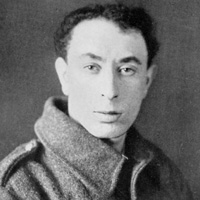Isaac Rosenberg - Biography and Works
Isaac Rosenberg was an English poet of the First World War who was born in the family of Lithuanian Jewish Barnett and Hacha Rosenberg in Bristol. At the age of 14, he left the school and became a trainee engraver as he was much more inclined to visual art and poetry too. But, soon in 1911, he left the training as an engraver and attended the Slade School of Fine Art, London.

Isaac Rosenberg (1890 -1918)
During this time, he seriously studied many great artists like David Bomberg, Mark Gertler and Dora Carrington. He started writing poetry and drawing paintings, and published some poems in Night and Day, in 1912 and took part in the Whitechapel Gallery exhibition in 1914.
As he suffered from chronic bronchitis, he moved to the warmer climate of South Africa. There he lived with his sister Mina and wrote a poem called On Receiving News of the War. He was a vehement critic of the war from the beginning. He returned to Britain in search of a permanent job, but as he could not get any, he joined the British Army, and said that he did not join the British Army out of the interest of patriotic feeling. It was his financial need to join the army force. Even in the army when he was in different trenches during the war, he wrote poems: Break of Day in the Trenches, Returning we Hear the Larks, and Dead Man's Dump. His health condition started to worse, and he was removed from the Frontline. He started to deliver barbed wire to the trenches. He wrote Dead Man’s Dump in this period. He was transferred to many places. In 1918, German Army attacked on the Western Front. Rosenberg sent his last letter with a poem called Through These Pale Cold Days before going to the Frontline. He was killed in 1918 along with another ten soldiers in a town named Fampoux.
Rosenberg’s experience of life both before and during the war was different from that of the other war poets. Most of them were from the middle or upper classes (and were officers in the war) while he came from a working-class family and served as an ordinary soldier. For this reason he had much less of a formal education than they did, and this is reflected in the language of his poetry as well as -the events it described. His language has great life and energy; it does not look back to the models and traditions that had been developed over the years, but gives the feeling that it had been forced into new forms to communicate a new experience. In one of his poems he describes how a soldier, at the moment of death, hears the sound made by the wheels of the cart in which Rosenberg is riding:
His dark hearing caught our far wheels And the choked A soul stretched weak hands To reach the living word the far wheels said.... So we crashed round the bend, We heard his weak scream, We heard his very last sound, And our wheels grazed his dead face.
